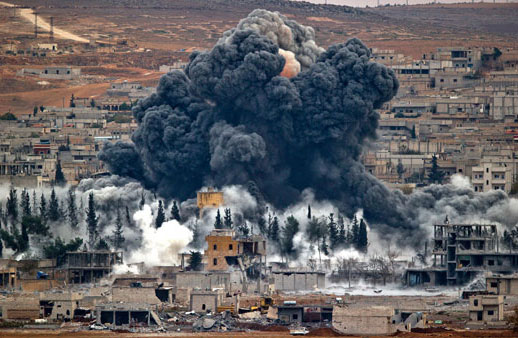 The US military is reviewing several incidents in which civilians may have been killed in coalition air strikes against Islamic State jihadists in Iraq and Syria, officials said.
The US military is reviewing several incidents in which civilians may have been killed in coalition air strikes against Islamic State jihadists in Iraq and Syria, officials said.
The comments marked the first time the US military has acknowledged that the air war may have exacted a toll on civilians.
US Central Command, which is overseeing the air campaign, initially looked into 18 cases and concluded 13 were not credible but five merited further review. Of those, two incidents -- one in Iraq and one in Syria -- prompted formal investigations, defense officials told AFP.
The current probes involved one case that occurred as recently as December 26, officials said.
"What I know is that Central Command is investigating several (of) what they believe to be credible allegations of civilian casualties," Pentagon spokesman Rear Admiral John Kirby told reporters.
"This is something we always take seriously. We are very mindful of trying to mitigate the risk to civilians every time we operate, everywhere we operate."
His comments marked a shift as the Pentagon had insisted for months they had not confirmed any instance of civilian deaths from the bombing raids.
Human rights organizations, however, have previously reported that dozens of civilians have been killed in the US-led air strikes, mainly in Syria.
The Britain-based Syrian Observatory for Human Rights said in October that 32 civilians were killed after the first month of coalition strikes in Syria, as well as 467 fighters from the Islamic State group.
"It would be highly unlikely that there would be no civilian casualties at this stage in the air campaign," said one US defense official, speaking on condition of anonymity.
But the American military was not on the ground in Syria and had a relatively small presence in Iraq, so it was difficult to say definitively how many civilians may have been killed in the air war so far, the official added.
- Credible evidence -
Allegations of possible civilian casualties had come from a range of sources including the military's own reviews and internal reporting, the State Department, and accounts by news media and non-governmental organizations, said Major Curtis Kellogg, a spokesman for US Central Command.
"A source is generally deemed to be credible if the source provides verifiable information, such as corroborating statements, photographs or documentation that can help us determine whether an allegation is founded," Kellogg said.
But the two formal investigations currently under way "are the direct result of our own internal review process and not the result of allegations received from outside of DoD (the Department of Defense)," he said in a statement.
Investigations can cover areas including "technical, mechanical or human errors involved in the strikes," he said.
"The current environment on the ground in Iraq and Syria makes investigating these allegations extremely challenging. Traditional investigatory methods, such as interviewing witnesses and examining the site, are not typically available," he said.
As of mid-December, commanders said more than 1,300 air strikes had been carried out in Syria and Iraq. The vast majority of the raids have been conducted by US fighter jets, bombers and drones.
Air strikes against the IS group in Iraq began on August 8 and were extended into Syria on September 23.
